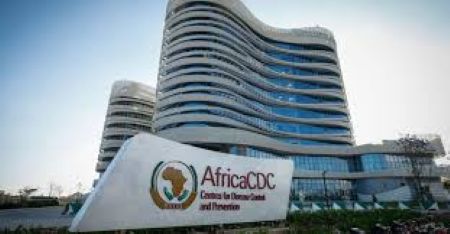The Africa Centre for Disease Control and Prevention (Africa CDC) has described Nigeria’s ongoing health sector reforms as a model that other African nations can replicate to strengthen their Primary Health Care (PHC) systems.
Dr. Jean Kaseya, Director-General of the Africa CDC, stated this on Thursday in Abuja during the Joint Annual Health Sector Review (JAR 2025).
The review serves as a platform to assess progress, share lessons, and promote accountability in Nigeria’s health sector.
This year’s event, themed “All Hands One Mission: Bringing Nigeria’s Health Sector to Light,” highlights the strength of the people, the resilience of health systems, and the dedication of front-line workers.
Kaseya said the presence of Nigeria’s Minister of Finance at the meeting signified a strong political commitment rarely seen elsewhere.
“By bringing the Minister of Finance into this discussion, Nigeria is demonstrating strong political will. In many countries, finance ministers do not attend health reviews,” he said.
“What we see here is genuine leadership and momentum transforming the system,” he added.
He cited Rwanda’s community-based health insurance as a model, noting that 88 per cent of its population is covered, drastically reducing out-of-pocket health spending.
“Imagine if Nigeria cuts out-of-pocket spending by 88 per cent. The world would migrate here because it would become another paradise,” he said.
Kaseya commended Nigeria’s reforms, including the Sector-Wide Approach (SWAp), digital transformation agenda, and efforts to boost domestic and innovative health financing. He said these align with continental goals to reduce reliance on Official Development Assistance (ODA).
He revealed that Nigeria’s digital payroll reform had already saved over ₦220 billion by eliminating ghost workers and reducing inefficiencies in the health sector.
Kaseya also lauded Nigeria’s collaboration with the private sector, citing Aliko Dangote’s investment in mosquito bed net production as an example of home-grown leadership that strengthens national capacity.
Under President Bola Ahmed Tinubu and Coordinating Minister of Health and Social Welfare, Prof. Muhammad Pate, Kaseya said Nigeria is showing how nations can expand fiscal space for health through better planning, transparency, and resource mobilization.
“When you plan properly, digitalize your systems, eliminate ghost workers, and strengthen insurance coverage, you don’t need more than 30 per cent external aid to fund your health system. That is the direction Africa must take,” he said.
He disclosed that Nigeria, along with a few other countries, has been selected as a pilot nation for integrated health system alignment and performance tracking over the next two years.
According to him, global partners, including Gavi and the Global Fund, will now be encouraged to align with Africa’s Lusaka Agenda, which promotes donor coordination and stronger national ownership of health systems.
“We are asking all partners to become Lusaka compliant. Without supporting the SWAp and national priorities, it is useless. Nigeria’s example shows it can be done,” Kaseya said.
He reaffirmed Africa CDC’s confidence in Nigeria’s health reforms, noting that the country’s progress is evidence-based and producing measurable results.
“I came here for the world to know that Nigeria is moving forward. When I speak about Nigeria, I do so as a neutral observer who has seen the evidence of real progress,” he said.


